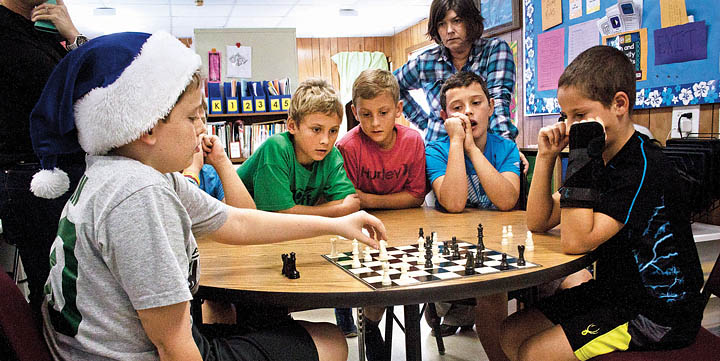Dylan Chaney loves chess. He has been playing half his life and he believes global conflicts would be better resolved over a chessboard. He defeats opponents with thoughtful strategy — mirroring their moves while arranging his pawns to protect his other pieces.
He is also 10 years old.
Dylan was one of the oldest Wrightsville Beach School students who took part in the school’s double elimination chess tournament Dec. 17, which culminated in a dramatic best-of-three finish between two of Dylan’s classmates.
The tournament started at 8 a.m. Teachers lined up 25 chessboards on cafeteria tables as pairs of children faced off. Three hours later, only a handful of students were left.
The top finishers from each grade received an award certificate. Eliminated students were sent back to class, further increasing the incentive to win.
The children practice chess every Friday morning for 30 minutes before school, said Katherine Kochakji, the teacher who organized the tournament. Chess club is an elective activity that starts at 7:30 a.m. and about 50 students participate.
Wrightsville Beach School’s tournament is the culmination of that practice, but teachers across the county are trying to organize a tournament in the spring involving multiple schools.
Kochakji said she created chess club because the game teaches many different learning concepts.
“There are just so many things that the mind has to go through in order to play a game of chess,” she said. “It’s such a strategic game.”
It also teaches concentration, she said, gesturing to the nearby table where two fourth graders, Will Newton and Max Sherman, huddled over a chessboard, playing for the championship. Nine-year-old Newton absentmindedly pushed his Santa hat back on his forehead as he studied the board.
Will just learned to play chess last year, but he plays often, both at school and at home. His mother, Jeannine Newton, said she recently put a large chessboard in their house. She and her husband are chess players themselves and they agreed to serve as tournament volunteers and, occasionally, referees.
Newton said she loves how the game encourages strategic planning.
“They think ‘Okay, if they’re going to do this, then I’m going to do that,’ and that’s so cool to me,” she said.
Will is fairly inexperienced compared to his opponent, Max. Max learned to play chess four years ago from his grandfather, a professional chess player.
After a few minutes, Max puts Will’s king in checkmate using a precise strategy he implements every game. He sets up a defense starting with his pawns and then, he said, “I just attack with my bishops.”
Will’s mistake was leaving his queen vulnerable, Max explained. “That was a game changer.”
Because of the double elimination format, the two faced off again. This time, only five minutes into the game, Will exclaimed, “Check mate!”
“Wow, I’ve never beaten Max before,” Will said, giggling nervously.
The boys sat down for the tiebreaking game.
Other fourth-graders gathered around, watching silently as Will and Max made each careful move. After twenty tense minutes, Will was left with only his king, and Max surrounded him with several pawns and a queen, clinching the victory.
The game ended as thrilling matches do: with cheers from the spectators and a show of sportsmanship from both competitors. They shook hands and headed back to fourth grade together.
email [email protected]




